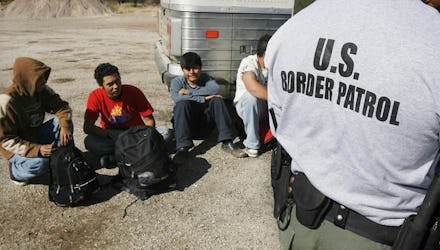Immigration Reform 2013: Catholic Clergy Plead For Action

During the stagnating debate over federal immigration reform, a coalition of 13 Catholic bishops from along the Texas-Mexico border have published an open letter titled Family Beyond Borders, which strongly denounces an immigration system that's breaking up families. One bishop, Daniel Flores of Brownsville, Texas, criticized "a system of law that has as its goal the separation of families."
The letter includes real examples of this separation, such as Josefina and Clara, who each had their children taken and placed in foster care because of their undocumented status. Both women were detained and deported and have had no contact with their children since. The letter also critiques the private for-profit detention center industry for lobbying against immigration reform in order to maintain their profits.
The letter was released last week, only days after President Obama spoke in San Francisco, saying that he would be willing to work with House Republicans who insist on a piecemeal approach to reform rather than a single, complete overhaul of the national immigration system. However, Democrats in Congress have strongly opposed a piecemeal effort that excludes a path to citizenship, which is the exact aspect of immigration reform that Republicans are wishing to bypass by advocating for piecemeal legislation.
Despite the supposed separation of church and state in this nation, as well as their tax-exempt status, religious organizations have always had significant influence over government policies. In the contemporary American political environment, this often translates into Christian groups advocating for socially conservative approaches on matters like abortion, birth control, and same-sex marriage. On immigration reform, the Church is actually taking a stance that many might call liberal. In fact, the publication of the Family Beyond Borders letter is only the latest development in the story of how the Catholic Church has been pushing Republican lawmakers to side with Democrats on immigration reform. Such social progressivism from Christians in the United States only makes sense in light of the fact that the Catholic Church in the U.S. has an enormous Hispanic presence, and it's trending toward a Hispanic majority in its membership.
It's important to recognize that by focusing on compassion and family values, many religious groups can actually end up on the progressive end of the spectrum on a number of issues. Pope Francis recently condemned rising social inequality and the continuing plight of the poor, criticizing capitalism as a system of "tyranny." His lack of disdain for gay marriage also came as a surprise to many.
In the U.S., many issues have been strategically framed to make people believe that Christian values are synonymous with Republican values. What if, for instance, Christians thought of same-sex marriage as a matter of having compassion for all, rather than a defense of family values? Catholics are right to push for immigration reform, but that stance should be based on actual compassion, rather than it being a strategy to please their membership. If Catholics were increasingly homosexual in the U.S., would bishops begin lobbying aggressively for same-sex marriage?
Religious groups ought to advocate for progressive policies on issues such as immigration and same-sex marriage not out of consideration of their demographics, but out of consideration for their actual values which, in spite of the political framing of many issues by Republicans, may just turn out to be progressive.